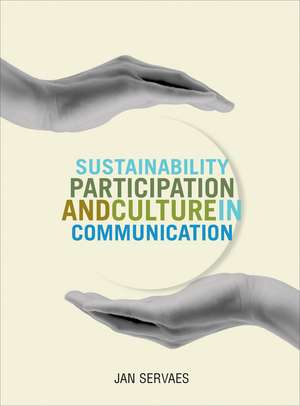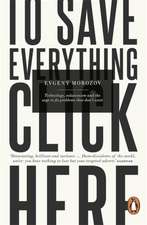Sustainability, Participation and Culture in Communication
Editat de Jan Servaesen Limba Engleză Paperback – 2 mai 2013
At a time when sustainability is on everyone’s lips, this volume is one of the first to offer an overview of sustainability and communication issues—including community mobilization, information technologies, gender and social norms, mass media, interpersonal communication, and integrated communication approaches—from a development and social change perspective. Drawing on contemporary theories of communication as well as real-world examples from development projects around the world, the contributors showcase the increasing richness and versatility of communication research and practice. Together, they make a case for adopting a more comprehensive perspective on communication in the areas of development and social change.
Preț: 241.98 lei
Nou
Puncte Express: 363
Preț estimativ în valută:
46.30€ • 48.34$ • 38.32£
46.30€ • 48.34$ • 38.32£
Carte disponibilă
Livrare economică 14-28 martie
Livrare express 28 februarie-06 martie pentru 39.96 lei
Preluare comenzi: 021 569.72.76
Specificații
ISBN-13: 9781841506616
ISBN-10: 1841506613
Pagini: 410
Ilustrații: black & white illustrations, black & white tables, figures
Dimensiuni: 178 x 229 x 25 mm
Greutate: 0.68 kg
Editura: Intellect Ltd
Colecția Intellect Ltd
ISBN-10: 1841506613
Pagini: 410
Ilustrații: black & white illustrations, black & white tables, figures
Dimensiuni: 178 x 229 x 25 mm
Greutate: 0.68 kg
Editura: Intellect Ltd
Colecția Intellect Ltd
Notă biografică
Jan Servaes is the UNESCO Chair in Communication for Sustainable Social Change at the University of Massachusetts, Amherst.
Cuprins
List of Acronyms
List of Figures and Tables
Introduction: The Kaleidoscope of Text and Context in Communication
Jan Servaes
2. Powerful Beyond Measure? Measuring Complex Systemic Change in Collaborative Settings
Adinda Van Hemelrijck
Part 1: Sustainable Social Change
3. The Global Agenda: Technology, Development, and Sustainable Social Change
Toks Dele Oyedemi
4. ICTs and Mobile Phones for Development in Sub-Saharan African Region
Tokunbo Ojo
5. Fair Trade Practices in Contemporary Bangledeshi Society: The Case of Aarong
Fadia Hasan
6. Asserting Contested Power: Exploring the Control Resistance Dialectic in the World Trade Organization’s Discourse of Globalisation
Rachel Stohr
Part 2: (New) Media for Social Change
7. Revolutions, Social Media, and the Digitization of Dissent: Communicating Social Change in Egypt
Emily Polk
8. Two Cases and Two Paradigms: Connecting Every Village Project and CSO Web2.0 Project in China
Song Shi
9. From Liberation to Oppression: Exploring Activism through the Arts in Authoritarian Zimbabwe
Verity Norman
Part 3: Culture and Participation
10. Right to Communicate, Public Participation, and Democratic Development in Thailand
Boonlert Supadhiloke
11. The Child Reporter’s Initiative in India: A Culture-Centered Approach to Participation
Lalatendu Acharya and Mohan Jyoti Dutta
12. Advancing a Pedagogy of Social Change in Post-Katrina New Orleans: Participatory Communication in a Time of Crisis
David J. Park and Leslie Richardson
13. Gender as a Variable in the Framing of Homelessness
Solina Richter, Katharina Kovacs Burns, Ramadimetja Shirley Mogale, and Jean Chaw-Kant
Part 4: Health Communication
14. Understanding the Spread of HIV/AIDS in Thailand
Patchanee Malikhao
15. Framing Illness and Health on the USAID Website of Senegal
Joelle Cruz
16. Communication for Social Change in Kenya: Using DVD-led Discussion to Challenge HIV/AIDS Stigma among Health Workers
Katrina Philips and Betty Chirchir
17. Effect of a Public Service Announcement on Couple Testing for HIV in Uganda on Beliefs and Intent to Act
Jyotika Ramaprasad
18. Crime and Punishment: Infidelity in Telenovelas and Implications for Latina Adolescent Health
Tilly A. Gurman
Conclusion: Communication for Sustainable Social Change Is Possible, but not Inevitable
Jan Servaes
Contributors
Authors Index
Subject Index
List of Figures and Tables
Introduction: The Kaleidoscope of Text and Context in Communication
Jan Servaes
2. Powerful Beyond Measure? Measuring Complex Systemic Change in Collaborative Settings
Adinda Van Hemelrijck
Part 1: Sustainable Social Change
3. The Global Agenda: Technology, Development, and Sustainable Social Change
Toks Dele Oyedemi
4. ICTs and Mobile Phones for Development in Sub-Saharan African Region
Tokunbo Ojo
5. Fair Trade Practices in Contemporary Bangledeshi Society: The Case of Aarong
Fadia Hasan
6. Asserting Contested Power: Exploring the Control Resistance Dialectic in the World Trade Organization’s Discourse of Globalisation
Rachel Stohr
Part 2: (New) Media for Social Change
7. Revolutions, Social Media, and the Digitization of Dissent: Communicating Social Change in Egypt
Emily Polk
8. Two Cases and Two Paradigms: Connecting Every Village Project and CSO Web2.0 Project in China
Song Shi
9. From Liberation to Oppression: Exploring Activism through the Arts in Authoritarian Zimbabwe
Verity Norman
Part 3: Culture and Participation
10. Right to Communicate, Public Participation, and Democratic Development in Thailand
Boonlert Supadhiloke
11. The Child Reporter’s Initiative in India: A Culture-Centered Approach to Participation
Lalatendu Acharya and Mohan Jyoti Dutta
12. Advancing a Pedagogy of Social Change in Post-Katrina New Orleans: Participatory Communication in a Time of Crisis
David J. Park and Leslie Richardson
13. Gender as a Variable in the Framing of Homelessness
Solina Richter, Katharina Kovacs Burns, Ramadimetja Shirley Mogale, and Jean Chaw-Kant
Part 4: Health Communication
14. Understanding the Spread of HIV/AIDS in Thailand
Patchanee Malikhao
15. Framing Illness and Health on the USAID Website of Senegal
Joelle Cruz
16. Communication for Social Change in Kenya: Using DVD-led Discussion to Challenge HIV/AIDS Stigma among Health Workers
Katrina Philips and Betty Chirchir
17. Effect of a Public Service Announcement on Couple Testing for HIV in Uganda on Beliefs and Intent to Act
Jyotika Ramaprasad
18. Crime and Punishment: Infidelity in Telenovelas and Implications for Latina Adolescent Health
Tilly A. Gurman
Conclusion: Communication for Sustainable Social Change Is Possible, but not Inevitable
Jan Servaes
Contributors
Authors Index
Subject Index
Descriere
At a time when sustainability is on everyone’s lips, this volume is one of the first to offer an overview of sustainability and communication issues—including community mobilization, information technologies, gender and social norms, mass media, interpersonal communication, and integrated communication approaches—from a development and social change perspective. Drawing on contemporary theories of communication as well as real-world examples from development projects around the world, the contributors showcase the increasing richness and versatility of communication research and practice. Together, they make a case for adopting a more comprehensive perspective on communication in the areas of development and social change.











